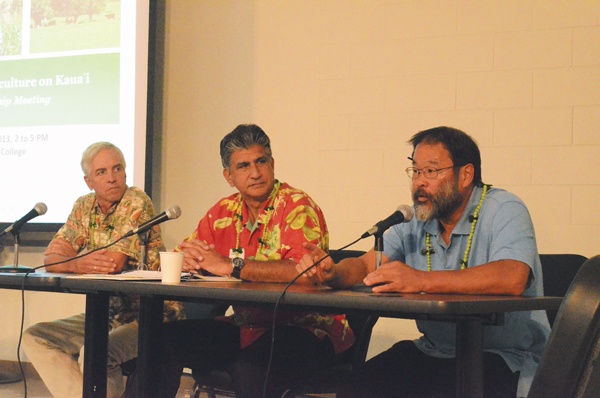PUHI — “Farming is not just an economic endeavor,” Ray Maki said. “It’s a personal and spiritual endeavor.” And it’s an endeavor that bears no fruit without water. Maki, owner and operator of Permaculture Kauai, was one of six panelists
PUHI — “Farming is not just an economic endeavor,” Ray Maki said. “It’s a personal and spiritual endeavor.”
And it’s an endeavor that bears no fruit without water.
Maki, owner and operator of Permaculture Kauai, was one of six panelists to discuss “The State of Water and Agriculture on Kauai” during the Kauai Planning and Action Alliance’s fall membership meeting Monday afternoon.
In addition to county and state parks, the KPAA has identified water and ag as top issues impacting Kauai and its future.
About 70 people attended the discussion, held at Kauai Community College.
Attendee Isobel Storch is the owner of a small, 1-acre organic farm in Puhi.
“Obviously, land and water issues are of great concern to us,” she said. “Clearly, we would like to see more farmland become available to small farmers. Small plots, one to five acres available at reasonable rents, with available good, clean water that’s not polluted.”
Right now, she said that doesn’t seem to be an option.
“I was sort of hoping today to get some idea of whether there was going to be support for doing that,” she said. “It’s hard because you really don’t have the overall support to be a successful farmer.”
Each of the six guest panelists — three on water and three on ag — offered their vision for the future, challenges to overcome, initiative and suggestions.
For small Kauai farmers, Maki said marketing and distribution continue to be major problems.
“Supporting the small farmer here on Kauai is not just an economic choice, but it’s a sociological issue that supports not only our economy, but our people and strong cultural health,” he said.
Panelist Gary Ueunten and his wife, Glenna, operate a small, third generation farm on Kauai, started by his grandparents in the 1930s. He said major challenges include susceptibility to pests and diseases, limited resources and marketing.
Moving forward, Ueunten said partnerships and cooperatives will be keys to success.
“We need professionalism in agriculture,” he said. “We need to raise the bar. We need farmers to be correct in everything they do. Raise the right crops. Make a profit. Protect the environment. And we need to build our image. And that’s maybe one way we can attract new farmers.”
George Costa, director of the county Office of Economic Development, discussed a number of initiatives and projects at the county level.
One major challenge, according to Costa, is convincing the younger generation to consider farming as a career. He said the county must begin grooming the farming community.
“We’re going to need to look at raising our own farmers,” he said. “And my understanding is the average age of a farmer here on Kauai is well over 57 years of age.”
Panelists on water included Adam Asquith of the University of Hawaii SeaGrant Extension, Dr. Carl Berg of the Surfrider Foundation Kauai Chapter and David Craddick, who just resigned as manager of the Kauai Department of Water.
Asquith said Kauai must find a balanced use of its waters. Today, most surface water on the island is either completely unused, or over used.
“The law in Hawaii demands a balanced use of water,” he said.
Among other things, Craddick discussed the purpose of DOW’s proposal for a high level, horizontal well on Mount Kahili, which is to stop using existing water wells which are negatively impacting the flow of nearby streams.
Berg shared detailed information about water quality around the island, and said one of the greatest polluters of ocean waters and streams is agriculture.
“There is an old adage that the solution to pollution is dilution, you just add more water,” he said. “But that has led us into a terrible fate because it makes the assumption that that pollution is just magically going to go away. And it doesn’t.”
When it comes to water and agricultural issues on Kauai, Diane Zachary, president and CEO of KPAA, said there is no simple solution, but that she hopes Monday’s event was the beginning of an ongoing discussion.
“There are just lots of different ways we can all take action,” she said.
For more information, visit KPAA’s website at www.kauainetwork.org of call 632-2005.
• Chris D’Angelo, environmental reporter, can be reached at 245-0441 or cdangelo@thegardenisland.com.


